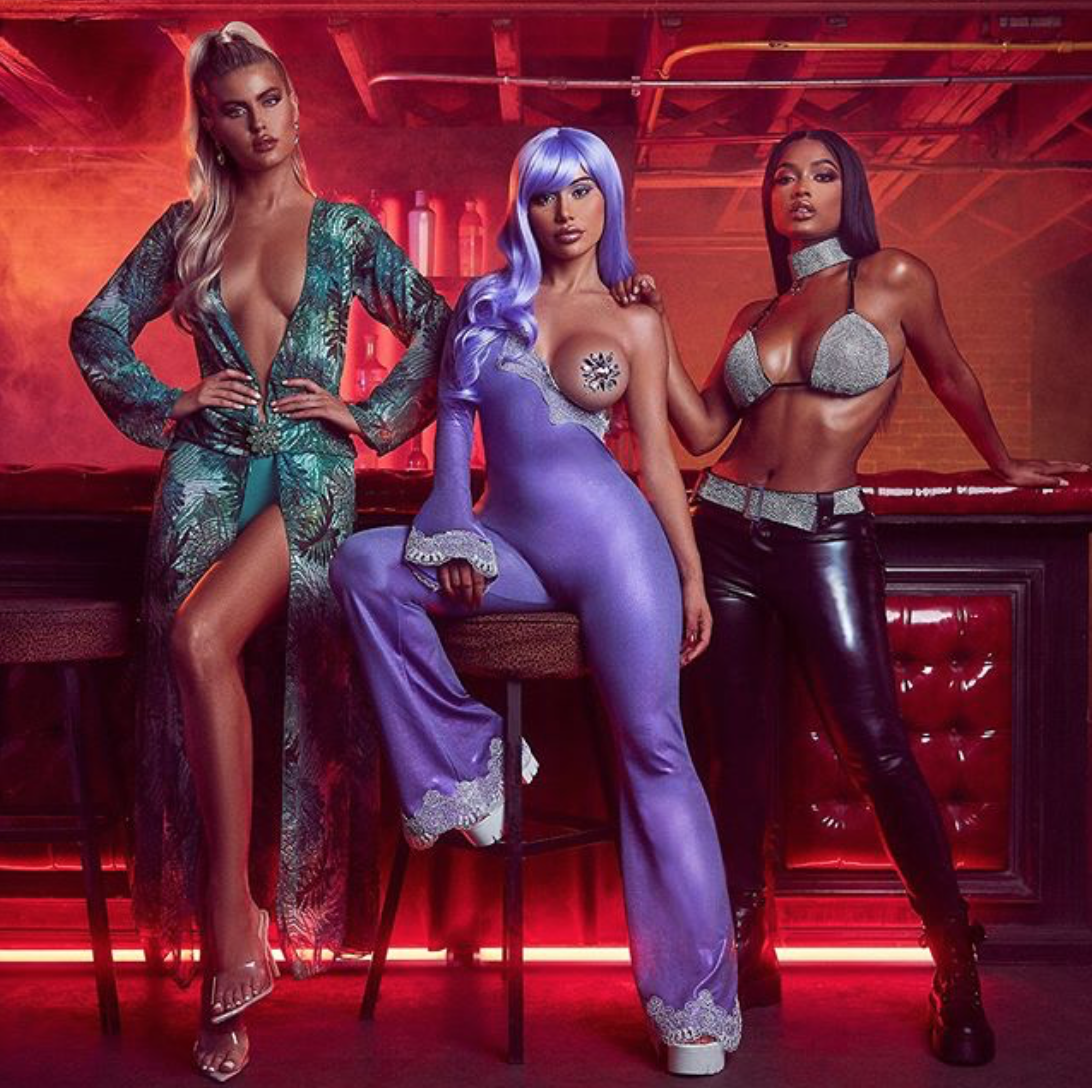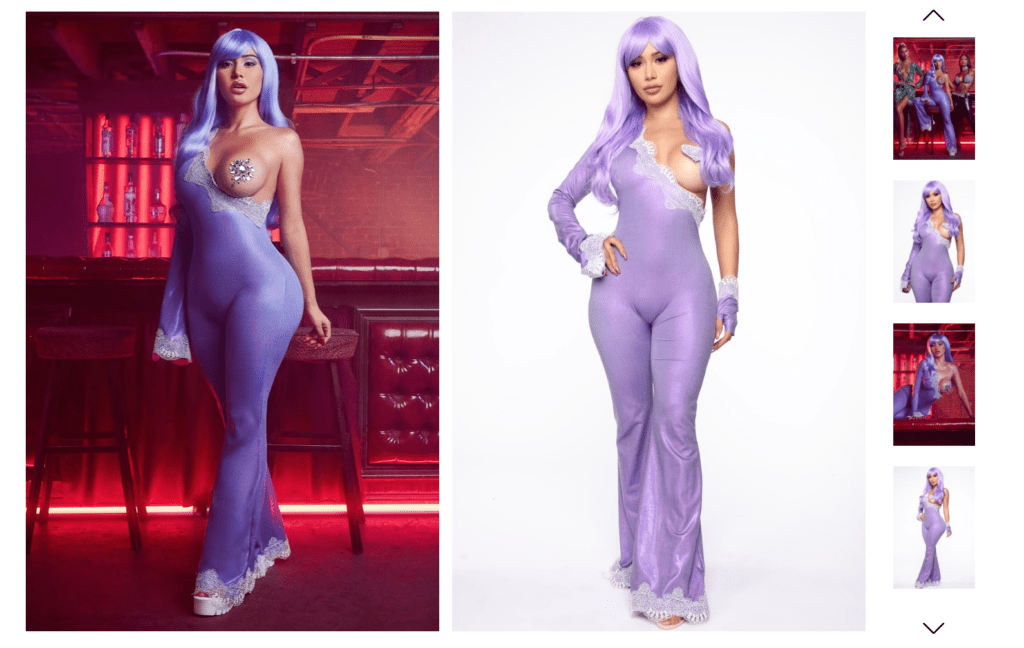In 1999, Lil Kim attended the MTV Video Music Awards in what would become an iconic look in a matter of hours. The famed rapper walked the red carpet and appeared on stage to present the Best Hip Hop video award alongside Mary J. Blige and Diana Ross in a lilac one-sleeved, one-piece paired with a single sequin pasty and wearing a matching purple-hued wig. Reflecting on the fashion moment almost 20 years later, Kim’s longtime stylist Misa Hylton told the New York Times, “By the morning, [Kim’s photo] was in nearly every newspaper in the world.”
Back in 1999, Lil Kim’s boundary-pushing outfit “made headlines as a fashion faux pas,” Marcus Holmlund wrote for the Times in 2016. However, fast forward two decades and that same look is “recognized as a seminal pop-culture moment,” one that is incontrovertibly tied to Lil Kim and her role as “the provocateur she’s recognized as today,” according to Hylton. Nary will you find a rundown of iconic Lil Kim fashion that does not include her VMA look.
A year later, Jennifer Lopez walked the Grammys red carpet on a tropically-printed green cut-to-the-navel Versace dress. “That green dress” – as it has largely become known – would similarly become synonymous with the singer after “catching the world’s attention” in 2000, per Vogue. It was so iconic almost from the outset that Google’s executive chairman Eric Schmidt said a few years ago that at the time of the 2000 Grammys, J.Lo’s dress “was the most popular search query we had ever seen.”
The dress – or better yet, the dress as worn by J.Lo, herself – has become such a cultural touchpoint that the Hustlers star set the internet ablaze again when she closed the Fall/Winter 2019 Versace runway show in Milan in a very similar version of the original dress, the latter of which actually has its own Wikipedia page.
Given the sheer level of fame associated with Lil Kim’s 1999 VMAs outfit (paired with the current appeal of all things 90s), and of the synonymousness between J.Lo and her Versace dress, it is not surprising that lookalike versions of these garments can be found alongside get-ups inspired by those worn by late singers Selena and Aaliyah, and modern stars like Cardi B and Kendall Jenner in Fashion Nova’s lineup of Halloween costumes. According to a release from the fast fashion brand, consumers can “recreate [some] of the most iconic looks worn by [their] favorite Hollywood celebrities this Halloween with Fashion Nova’s legendary costumes.”
The “legendary” nature of Lil Kim’s VMAs outfit and J.Lo’s Grammy’s look, and the fact that these garments can almost instantaneously be tied to the famed musicians by individuals with knowledge of late 90s/early 2000s fashion or pop culture more broadly (so much so that it has become a Halloween costume) is precisely why Fashion Nova’s new offerings present an interesting legal question: can an outfit give rise to right of publicity issues?
 image: Fashion Nova
image: Fashion Nova
A commonly-cited cause of action when the names or photos of celebrities are used in an unauthorized manner, such as in the lawsuit that Kim Kardashian filed against Missguided or more recently, the one that Ariana Grande waged against Forever 21, the right of publicity is a state-specific legal doctrine developed to give individuals the ability to prevent others from commercially exploiting elements of their likenesses without their permission.
The right of publicity – which varies widely by state – is well-known to extent to names and images of them, but according to Cornell Law School’s Legal Information Institute, it may also extend to “other recognizable aspects of one’s persona,” depending on the state. For instance, courts in California, where Fashion Nova is headquartered, have held that drawings, if they are sufficiently detailed, can constitute a “likeness,” and even a robot, if it is detailed enough for an individual to “reasonably determine” that the it depicts the specific plaintiff in the case – as the Ninth Circuit Court of Appeals determined in the Vanna White v. Samsung Electronics America case – can give rise to right of publicity violations.
But could the same be true for an outfit? In other words, could an individual’s truly “iconic” outfit amount to being part of her likeness, and thus, would the sale of the outfit in costume form amount to a violation of an individual’s right of publicity?
While famous outfits have not traditionally been the source of much right of publicity litigation, at least two cases – both in New York courts – have made mention of attire. In the 1979 right of publicity case that descendants of actors Stanley Laurel and Oliver Hardy brought against Worldvision Enterprises for allegedly impersonating the Laurel and Hardy characters in a pilot and proposed television series, the court held the television company’s use of the characters violated a previously issued injunction which prohibited it from impersonating Laurel and Hardy’s “physical likeness or appearances, costumes and mannerisms, and/or the simulation of their voices, for advertising or commercial purposes.” The key there being “costumes.”
More recently, entertainer Robert Burck – who is better known as the Times Square “Naked Cowboy” – filed suit against M&M candy-owner Mars for allegedly violating his right of publicity by featuring an M&M candy dressed in his signature outfit of cowboy hat and boots, white briefs, and a guitar. The court, siding with Mars, dismissed the right of publicity claim because the billboard did not contain a “portrait or picture” of Burck.
The case was not a total loss for Burck, though. The court refused to dismiss his Lanham Act false endorsement claim, one that arises from the unauthorized use of a celebrity’s identity, such as “visual likeness, vocal imitation, or other uniquely distinguishing characteristic,” which is likely to confuse consumers as to the plaintiff’s sponsorship or approval of the product. The court held that Burck had sufficiently made his case that consumers were likely to believe that he was affiliated with or endorsed M&M.
Still yet, in 2010, Hebrew University of Jerusalem, which maintains all existing rights for the late Albert Einstein, filed suit against costume wholesaler Forum Novelties, arguing that its Albert Einstein costume violated Einstein’s right of publicity. That case settled out of court but appeared to be resolved by way of Forum licensing the Einstein name and likeness from Hebrew University.
What does all of this means for Fashion Nova and the celebrities whose likenesses it may or may not be encroaching upon with the costumes – particularly when paired with telling names, such as “Crush on You” for Lil Kim, a reference to her 1997 single, and “Love Don’t Cost A Thing,” a hit song from JLo? Well, the musicians’ lawyers could make a case, and potentially, a successful one. While it is “often hard for public figures – particularly politicians – to sue and win in these situations … because the right of publicity comes into conflict with the First Amendment, and our right to speak about and mock our leaders,” as Slate’s Torie Bosch aptly stated in connection with a rise in Hillary Clinton costumes, it is unclear what statement is being made in connection with the sale of the Lil Kim and JLo costumes.
Nonetheless, it might be telling that both costumes are still available for sale on Fashion Nova’s site, which could suggest that the celebs and their attorneys are not terribly bothered. As for consumers, based on the “best seller” status of the Lil Kim costume, they are certainly interested.











